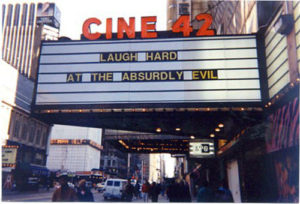I dropped out of college when I was 18. To move to Los Angeles. To become a rock star. It’s true.
‘Twas the age of Guns n’ Roses and bad cocaine, you see, tight jeans and stack-heel boots and just the right amount of black eyeliner to go with your shredded T-shirt, all required costumery for littering the Sunset Strip at midnight with cheap flyers (Kinko’s, goldenrod) promoting your glammed-out hair-metal band, the one with the pouty lips and epic hair glued in place by more Aqua Net than 10,000 New Jersey senior proms, combined.
And lo, it was glorious.
It was also fabulously doomed. Every youngblood in the L.A. music school I attended (Musicians’ Institute, Hollywood) wanted to be Eddie Van Halen, everyone wanted to make epic rock, fill stadiums, inspire millions, be swarmed by girls, shred riffs to delight the gods, hang out with Tommy Lee and Slash in stripper-crammed opium dens of debauched awesomeness. I mean, who wouldn’t?
We practiced hard. We partied dumb. We prowled the gritty byways of Hollywood Boulevard long before it became the overblown, Vegas-wannabe tourist trap it is now, scarfing scurvy pizza slices at 1:00AM, honing our skills with girls, building camaraderie, trying with all our might to appear like badass street rockers and not the product of comfy middle-class suburbia nearly all of us so clearly were.
In short: It was a fast, awesome, entirely stupid ride, shallow as Bret Michaels and twice as vain, so intellectually vacuous that, within a few years, I hurried back in the welcoming arms of academia, where I fell in mad love with real learning and eventually graduated, in my late 20s, summa cum laude from Berkeley. What a ride.
Why share all this silliness? Because there appears to be a strange parallel afoot. Because I recently found myself entranced by Nellie Bowles’ terrific profile over in California Sunday magazine, a tale of the new hordes of “lost boys” of San Francisco, all these naïve, clean-cut, mostly white teenaged computer whizzes from affluent families who are dropping out of college (and, increasingly, high school) to move to San Francisco.
They’re here to code, of course. To found companies. To singe their brains with a million lame logos. Which is to say, not for the fame, or the girls, or the fun drugs, or the free love (different era, but still).
They’re here for the money. For the startup score, the “dream” of landing vast heaps of VC capital that comes from building yet another app, portal, algorithm for the sake of their multimillionaire captors, all to bring them, if not sex or depravity, then surely the tech equivalent – way too much cash, way too soon.
This is the tech bubble’s newest, most sinister message: Who needs college, really? Who needs exposure to a broad range of ideas, cultures, religions, literature, ways of being in the world exactly at the time you’re most open and impressionable to discovering them? Come and burn away the most supple years of your life at a mediocre startup that will almost certainly fail! Bury your face in a screen and work like a slave on something to make capitalist drones like Marc Andreesen and Peter Thiel even richer! Because tech!
Too harsh? Maybe. I’m sure it’s not that bad. I really do want to champion these boys, to think they’re here taking charge of their lives, creating cool stuff, taking risks, breaking free from the bonds of normal.
But that’s not what it feels like. It feels like the opposite, sort of deadly, like they’re unwittingly adding a new, far more damaging form of bondage before they’re even ready for it – money.
Here’s what the “tech startup dream” doesn’t tell the average dropout coder: All that VC/buyout money – assuming you score it – doesn’t offset the fact you’re locked to a screen for 16 hours a day, damaging your body, widening zero horizons, exploring zero life alternatives, having awkward teen sex with no one, sapping your life force, curdling your soul.
And for what? To be the next Zuckerberg? The King of Milquetoast? It’s like wanting to be the next Toyota Camry.
I’m happy to be proven wrong? The thing is, while my L.A. stint was all kinds of tawdry and ridiculous, it was also full of intrepid, raunchy adventures. We played clubs, partied in seedy hotels, worshiped women, worked graveyard shifts in recording studios net to real rock stars, hacked our own clothes and did our own hair, bootlegged beer and cheap vodka like pros.
And we practiced, studied the legends, honed our scales until the wee hours, thrilled by music, by our freedom, by all the dumb sex and laughter and endless possibility. Money had little to do with it, mostly because we didn’t have any.
These tech boys seem… different. They, too, sit around practicing – in quiet, pale clusters, coding their apps and designed workflows, numbly engaged in the most harmful activity known to humankind – slumped behind a screen, spines collapsed, eyes blurry, anima fading fast – all for someone else’s project, for the sake of rich, older white males who pat them on the head, buy them coffee and take them on free trips to their Tahoe condos. Cool? I guess?
In L.A., we plastered our dingy apartments with photos of rock stars, concerts, half-naked females, Ferraris and Marshall stacks. In SF, the tech boys plaster their walls, too – with Post-It Notes, scribbled with fantasy dollar sums, dreamy VC payouts and, well, that’s about it.
They do not appear to go outside. All food is delivered via app. There are few girls. Social skills appear limited to learning the right buzzwords to impress titanically self-important VC kingpins you never hear much about because, well, mostly because they’re wildly uninteresting. All they have is money, after all.
Here’s my question: Do these boys really have a clue what they’re doing here? And who they’re doing it for? And the engine behind it all? Do the realize how much they’re missing, everywhere else?
Perhaps this is the crux. It seems like these boys are being lied to. Tricked. Told that broad, free-form education outside the tech bubble is for suckers, largely because it won’t make you a dumb pile of cash by age 25 that you have no idea how to use and just makes you into a shallow, entitled clod no one likes to be around.
It’s capitalism’s most successful lie, isn’t it? Money is everything. Success in business is the only real measure of your worth, your happiness, your value in life. And by the time you wake up and realize it isn’t? Probably too late.
Let’s be fair: Some of these boys claim to be having tons of fun. They love the hackathons, the “secret” projects, friendships, hanging around “famous” VC bros. And of course there are lots of terrifically cool, smart people in tech. And who knows? Maybe some really will invent the thing that transforms, say, education, or energy, or politics. Totally possible.
This is merely to point up the palpable sadness that seems to run through their story, a weird sense of lifelessness and awkward entitlement, borne of capitalism’s ruthless one-dimensionality.
It makes you want to ask them: “Do you know how much more there is to life than inventing the next SnapChat, or PayPal, or Candy Saga Crush Hunt IV? Worlds more. Galaxies more. You have no idea.
“San Francisco is not the wild frontier it appears to be. It’s just a silly bubble full of made-up money and too many hoodies, signifying nothing.
“Go see the world. Mess with your boundaries. Throw out what you think you know. Trip up your sexuality, your lineage, your gods. Be amongst the trees, the oceans, the mountains of Other. Don’t skip college; dive into it even deeper, study astronomy and poetry and trickster hallucinogens in the desert. Figure out who you are before it’s too late, before money or some billionaire tech schlub decides it for you. Hey, it’s what Bret Michaels would have wanted.”
Read more here:: Attention teen dropouts racing to SF: The tech bubble is lying to you





